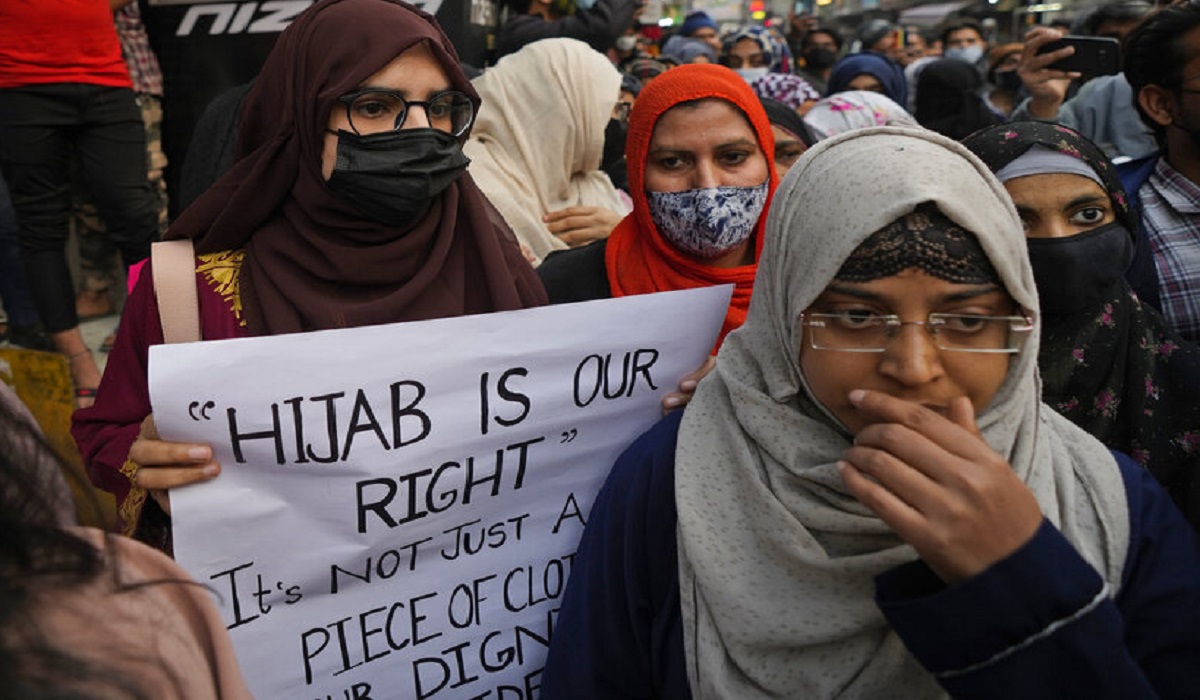Highlights
- Massive protests for and against wearing ‘hijab’ intensifies in several educational institutions
- Karnataka HC has ruled that no religious symbols are allowed for students until its final order
- Hijab controversy has taken political color and has drawn ire from several activists, leaders
Hijab Controversy: Massive protests for and against wearing ‘hijab’ have intensified in several educational institutes and colleges across Karnataka. The protests took a violent turn at some place earlier this week, following which the Karnataka government declared three days holiday for educational institutions. Meanwhile, hearing petitions challenging the ban on hijab in colleges, the Karnataka High Court ruled that no religious symbols are allowed for students until its final order, thus barring both hijab and saffron shawls in school and college premises.
The agitation began when a few Muslim girls students were denied entry to the class at Udupi Women's Pre-University college as they were wearing hijab. The protests intensified when a Muslim girl wearing a hijab entered the college, while a group of boys with saffron scarf shouted ‘Jai Shri Ram', trailing behind the woman. Since then, the row has spread to different parts of the state with other community students too responding by turning up in saffron shawls. The controversy has also taken a political color and has drawn ire from various political parties, activists, and leaders.
The issue around the restriction on religious dresses is getting traction worldwide. As the controversy around the Karnataka hijab heats up, here’s a look at countries that have banned face coverings, including hijabs, burqas, full-face helmets, and balaclavas. Austria, Denmark, France, Belgium, Bulgaria, Netherlands, China, Sri Lanka, and Switzerland are among the countries that have banned face veils.
Switzerland
In March 2021, Switzerland banned the headscarf in public, including ‘burqa’ or 'niqab' worn by Muslim women after a far-right proposal to ban facial coverings won a narrow victory in a binding referendum. The measure to amend the Swiss constitution passed by a 51.2-48.8% margin. However, the Swiss Central Council of Muslims said it was “a dark day” for Muslims.
France
France was the first European country to introduce a blanket ban on wearing burkas in public. In 2011, France banned face coverings with the “Law of 2010-1192: Act prohibiting concealment of the face in public space”. The act banned the wearing of face-covering headgear, including masks, helmets, balaclavas, niqābs, and other veils covering the face in public places. The ban also included the burqa if it covers the face. People who breach the ban are fined €150 (£130), and anyone who forces a woman to cover her face risks a €30,000 (£25,900) fine.
China
In 2017, China banned burqas, veils, and long beards in a predominantly Muslim province as a part of its crackdown against religious extremism. People who wear headscarves, veils, burqas, or clothing with crescent moon and star and long beards are prohibited from using public transportation.
Belgium
Following France’s footsteps in 2011, Belgium banned wearing full face-covering dress in public such as the burqa or the niqab, which covers the lower half of the face. In 2017, the European Court of Human Rights upheld Belgium’s ban on Islamic face veils following a legal challenge. People violating the law can face a fine or up to seven days in jail. Notably, Belgium only has around a million Muslims and out of those, only 300 wear burqa or niqab.
Denmark
In Denmark, the burqas were first banned in August 2018 months after validating the law in May that year. Hundreds of demonstrators marched in Copenhagen to protest against the introduction of Danish laws banning veils that fully cover the wearer’s face. The law imposes a fine of up to €135 for offenders.
Sri Lanka
Sri Lanka became the latest country to ban veils all forms of face veils in public places “due to national security concerns” as part of government legislation that took effect on 29 April 2021. The wearing of burqas was temporarily banned in 2019 after Easter Sunday suicide bomb attacks killed more than 260 people.
Germany
The German Parliament in 2017 backed a law banning face-covering veils for judges, civil servants and soldiers of the country.
Austria
In 2017, a legal ban on face-covering clothing was adopted by the Austrian parliament.
Bulgaria
In 2016, a ban on the wearing of face-covering clothing in public was adopted by the Bulgarian parliament with violators facing a fine of up to €750. However, it has made exemptions for people playing a sport, at work, or in a house of prayer.
The Netherlands
The Netherlands enacted a ban on face-covering clothing, popularly described as the "burqa ban", in January 2012. The ban applies to burqas, veils full-face helmets and balaclavas. The burqa ban came into force on 1 August 2019 in schools, public transport, hospitals and government buildings. The ban came into place here after 14 years of debate. In the Netherlands, a face-covering in public can invite a fine of at least €150.
Norway
In 2018, the Norwegian parliament voted to ban the burqa in schools and universities.
Sweden
In December 2019, the municipality of Skurup banned Islamic veils in educational institutions. Earlier, the municipality of Staffanstorp approved a similar ban
Republic of the Congo
In May 2015, the Republic of the Congo - also known as Congo-Brazzaville - became the first country in Africa to implement a burqa ban, even though the country has never been targeted with an Islamic terrorist attack.
ALSO READ | Karnataka Hijab controversy: What is Article 25 & the Govt's order - Explained

